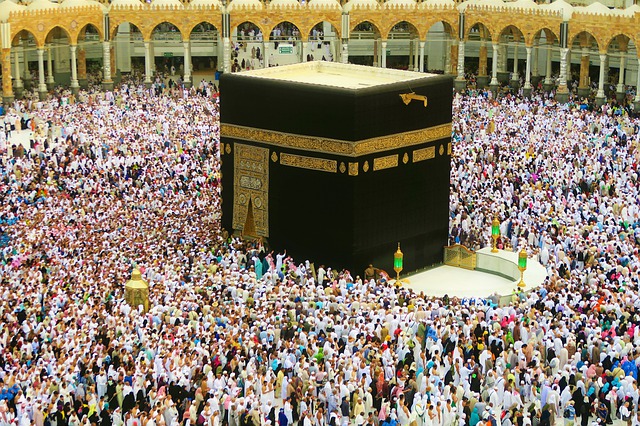Pillars of Islam are those essentials and fundamentals of Islam which are absolutely necessary to be accepted and followed by a person to called a Muslim. The most important obligation upon a Muslim is to learn about those things in which he has to believe and those which he has to practice.
These tenets or pillars of Islam are fundamental in order for a person to qualify as a Muslim. They are commonly shared by Muslims throughout the world and are as follows:
1. Imaan (Faith)
2. Salah or Namaz (Prayer)
3. Sawm (Fasting)
4. Zakat (Poor Due)
5. Hajj (Pilgrimage)
If one denies the obligatoriness of any of these pillars, he ceases to be a Muslim.
If a person forsakes them permanently, he too is considered as one dissociating himself from the group of Muslims.
In this post we are going to learn about the fifth pillar of Islam which is known as Hajj or Pilgrimage.
Related: Major beautiful mosques by Muslim rulers of India
Fifth Pillar of Islam – Hajj (Pilgrimage)
Hajj (Pilgrimage) is the fifth pillar of Islam. If a Muslim does not perform Hajj in spite of his ability to perform it, he may be considered a renegade according to some Quranic verses and Traditions.
Allah says in Quran:
“and announce among people about (the obligation of) Hajj, so that they should come to you on foot, and on every camel turned lean, traveling through every distant hilly pathway”. [Quran 22: 27]
This obligatory deed is performed at Makkah in Saudi Arabia in specified days of a specific lunar month.
Related: What is the importance of Masjid (Mosque) in Islam?
Rituals in Hajj
There are various acts to be performed by a pilgrim during Hajj such as:
- Wearing Ihram, which is a special dress for the occasion
- Staying in Mina
- Staying in Arafat
- Night stay in Muzdalfa
- Stoning the Satan
- Sarificing the animal
- Circumambulating the Kaaba
- Walking between the Hills of Safa and Marwa in Sai
All the acts done during the Hajj are in fact, ways to manifest faith in the Oneness of Allah, negate the undue importance of resources, renew trust in Allah, and strive to attain Allah’s pleasure.
Hajj is an open revolt against false traditions, customs and practices and is an occasion for Muslims to revive faith in Allah and learn to live a life of sacrifice and selflessness.
Hajj guarantees cultivation and preservation of such high aims, healthy emotions, noble spiritual and religious values, and selfless human and Islamic brotherhood which are stronger than any nationalistic or geographical ties.
Hajj is a call to follow the ways of Prophet Ibrahim, inculcate in oneself his true missionary spirit, and keep up the banner of his mission in all times and climes.
Every year a good number of religious scholars and pious and God-fearing people perform Hajj due to whose presence the environment of Hajj is deeply charged with spiritual effulgence.
Related: What is meant by Islamic culture?
Impact of Hajj on Pilgrims
The environment during Hajj moves the hearts even of the hard-hearted; the transgressors return to their Lord in repentance seeking His forgiveness; those eyes which never get wet shed tears profusely for the fear of Allah. The dead and forgetful hearts are revived with new life.
The mercy of Allah descends on the pilgrims, peace and tranquility enshrouds the whole environment, and the Satan finds no place to hide his face in shame.
The environment at the time of Hajj has a special effect. It seems as if it is charged with some kind of current. The pilgrims coming from different places to perform Hajj find their hearts once again enlightened with true faith.
They are blessed there with faith in Allah, pride in Islam, and true knowledge and understanding of the religion which they take back with them and from which they derive strength to face all kinds of negative persuasion, pressure, temptation and fear that they may encounter later.
After returning to their countries they share these blessings of Hajj with those who for some reason were not able to perform Hajj with them.
Thus, a current of faith runs through the whole body of the Muslim Ummah and creates in the ignorant desire to learn, in the weak and meek courage, and in the despondent and depressed enthusiasm and zeal.
Recommended:

